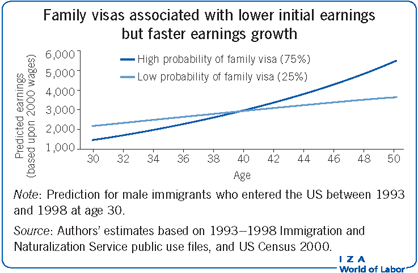Elevator pitch
Immigrants who start with low earnings, such as family-based immigrants, experience higher earnings growth than immigrants who are recruited for specific jobs (employment-based immigrants). This occurs because family-based immigrants with lower initial earnings invest in human capital at higher rates than natives or employment-based immigrants. Therefore, immigrants who start at low initial earnings invest in new human capital that allows them to respond to the ever-changing needs of the host country’s economy.

Key findings
Pros
Immigrants who enter the US on a family visa often have low initial earnings, but also high earnings growth; compared to natives or other immigrants, they invest more in new human capital, because their opportunity costs are low, and new host-country human capital often makes their home-country skills more usable.
The willingness of family-based immigrants to invest in new skills makes the host-country labor market more flexible to employer needs and enables some immigrant entrepreneurs to provide new types of goods and services.
Family-friendly immigration policies may aid in recruiting the most highly skilled migrants as they are concerned about immigration of their families and may have employment options in several different countries.
Cons
Uncertainty about their ability to remain in their host country reduces immigrants’ incentive to invest in new human capital.
Because immigrants often bring unusual combinations of home- and host-country skills to their jobs, countries with relatively inflexible occupation requirements may discourage immigrant human capital investment.